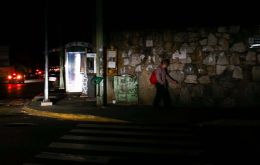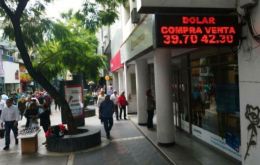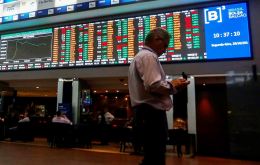MercoPress. South Atlantic News Agency
Tag: Inflation
-
Saturday, April 6th 2019 - 09:43 UTC
Trump again puts pressure on the Federal Reserve to lower interest rates

United States president Donald Trump said on Friday the US Federal Reserve should lower interest rates and take other unconventional measures to ease pressure on an economy that he said they slowed down. “I think they should drop rates,” Trump told reporters. “I think they really slowed us down. There's no inflation.”
-
Friday, April 5th 2019 - 09:26 UTC
Argentines take to the streets under pouring rain to protest Macri’s austerity

Argentine unions, small business owners and activists took to the rain-drenched streets of Buenos Aires on Thursday to protest against austerity measures under President Mauricio Macri, which they blame for amplifying worker hardships and sapping growth.
-
Sunday, March 31st 2019 - 17:07 UTC
Venezuela suffers the fifth mass blackout of the month

A new massive blackout was recorded this weekend in Venezuela after a nationwide interruption of electricity service this Friday, which was slowly restored in main cities as Caracas. However, a new relapse of the supply occurred on Saturday night, affecting 16 states of the country - more than half.
-
Wednesday, March 27th 2019 - 08:48 UTC
Argentine financial markets jittery over October elections uncertainty

Investors in Argentina are starting to get the jitters. The gap in yield between local and U.S.-issued bonds has roughly doubled in the last month in the face of stubborn inflation and mounting peso outflows, heaping pressure on President Mauricio Macri ahead of elections later in the year.
-
Saturday, March 16th 2019 - 10:15 UTC
IMF prepared to help Argentina stabilize exchange market volatility in election year

Argentina’s central bank wants to license market makers to help stabilize its embattled peso currency when the Treasury starts newly announced dollar sales in April. The bank hopes the market makers, dealers who agree to buy and sell at set prices, would bolster liquidity in the exchange market to help avoid the sharp gyrations the peso has suffered in recent weeks when it hit a record low of 42.5 pesos per dollar in thin trading.
-
Wednesday, March 13th 2019 - 08:12 UTC
Brazil February consumer prices rose 0.43%, and 3.89% in twelve months

Consumer prices in Brazil rose at a slightly faster pace than expected in February due to a rise in private education fees and food and beverage prices, statistics agency IBGE said on Tuesday. On a monthly basis, inflation rose by 0.43% in February, IBGE said, more than the expected 0.39% and up from 0.32% a month earlier.
-
Thursday, February 14th 2019 - 09:13 UTC
UK January inflation at at two-year low and below target

British annual inflation hit a two-year low point in January, undershooting the Bank of England’s 2.0 per cent target on falling oil and other energy costs, official data showed on Wednesday.
-
Wednesday, February 13th 2019 - 09:41 UTC
Stable low inflation and expansion forecasted by Brazilian financial market

Brazil's financial market has cut its forecast of the country's inflation rate from 3.94 to 3.87 percent for 2019 and kept the rate at 4% for 2020, the Central Bank of Brazil reported. According to the Focus survey conducted by the bank among Brazil's main financial institutions, the forecasts are within the official target of 4.25 percent, with a tolerance margin between 2.75 percent and 5.75 percent.
-
Sunday, February 3rd 2019 - 10:36 UTC
Latin American markets reacted positively to Fed' message of “wait and see”

Most Latin American stocks rose on Friday after U.S. economic data pointed to the possibility that the Federal Reserve could keep interest rates unchanged. Shares extended their rally after U.S. employment and manufacturing data underscored a strong economy with little wage inflation.
-
Tuesday, January 15th 2019 - 09:20 UTC
The salary is tripled in Venezuela: Increases to 6 dollars

Nicolás Maduro ordered an increase of 300% of the minimum wage on Monday, the 26th time he makes an announcement of this kind during his term. Also, an increase in the petro cryptocurrency was decreed and the president highlighted the economic management of his government, which he said in his annual report helped to turn Venezuela into the country with “greater socioeconomic equality”.
